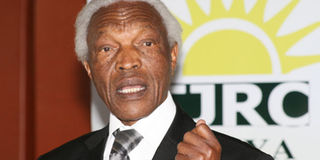Kiplagat’s team runs out of cash for operations

FILE | NATION. The chairperson of the Truth Justice and Reconciliation Commission Ambassador Bethuel Kiplagat. The commission is broke, a commissioner has announced.
What you need to know:
The team
Mr Bethuel A Kiplagat (chairman), Ms Tecla Namachanja (vice-chairperson), Mr Tom Ojienda, Ms. Margaret Shava, Mr Ahmed Sheikh Farah, Ms Gertrude Chawatama (Zambian), Mr Berhanu Dinka (Ethiopian) and Mr Ronald Slye (American). Ms Betty Murungi resigned after Mr Kiplagat declined to step aside over the allegations of impropriety. She was replaced as vice-chair by Ms Namachanja.
The Truth, Justice and Reconciliation Commission (TJRC) is broke, a commissioner has announced.
Ms Margaret Shava on Monday said although the commission had asked for Sh1.2 billion for its operations this financial year, it was only allocated Sh190 million.
“We actually require funding. We will only be able to operate effectively up to the end of this month,” Ms Shava said.
She told the Nation by telephone that the TJRC had exhausted the money it was allocated this financial year.
The commission is collecting statements before starting public hearings. Ms Shava said awareness on the TJRC was low due to lack of civic education.
The team, headed by Mr Bethuel Kiplagat, was to wind up in November 2011, but the TJRC Act allows an extension of six months.
“We are working to complete our report within time,” Ms Shava said.
Apart from the dry purse, the commissioner said TJRC was affected by conflict of interest.
She said TJRC, unlike other Agenda IV commissions, had not received any significant donor support.
Asked if the row over Mr Kiplagat’s suitability to lead the commission could have turned away donors, Ms Shava said: “That’s possible.”
She said donors were insisting on the government meeting its funding obligations before they could chip in.
Ms Shava was, however, optimistic TJRC would complete its work.
The civil society has been calling for the resignation of Mr Kiplagat, accusing him of complicity in human rights abuses when he served as permanent secretary and ambassador in the Kanu regime.
He was a senior government official during the Wagalla massacre and at the time of former Foreign Affairs minister Robert Ouko’s murder. He is also accused of illegal land allocation.
Mr Kiplagat has however defied calls from among others South Africa’s Nobel Desmond Tutu.
The TJRC is mandated to investigate and recommend appropriate action on “human rights abuses” committed between December 12, 1963 and February 28, 2008, when President Kibaki and Prime Minister Raila Odinga signed the peace and power-sharing deal. The TJRC is tasked to establish as complete a picture as possible of the causes, nature and extent of the post-election violence, including unresolved injustices such as the distribution of land and state resources.
The mandate includes politically motivated violence, assassinations, displacements and major economic crimes such as grand corruption and irregular acquisition of land. The Commission is mandated to recommend policies with regard to reparations for victims, to recommend prosecutions, and the creation of institutions conducive to a stable and fair society.
The Commission’s charter contains provisions for individual amnesty procedures if the Commission is satisfied that the applicant has made full disclosure of all relevant facts. The mandate stipulates that all findings of the Commission will be made public.




